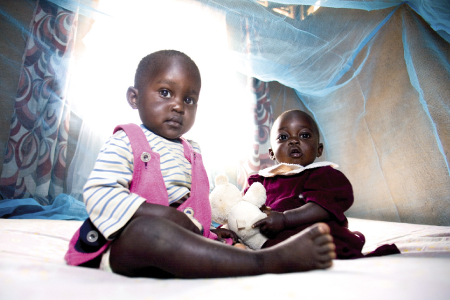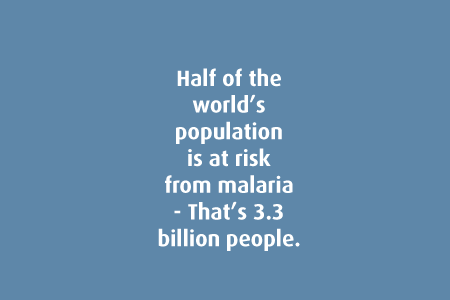
Malaria No More
Issue 67 April 2010
Still one of the world’s biggest killers, malaria is a preventable disease. Nadeem Javaid looks at what we can all do to end the cause of so much misery to the world’s poorest people.
Imagine starting off feeling flushed. Then there is the fever which slowly gets worse. You lose your appetite. You feel weak, so weak you can’t even move.
Then imagine falling unconscious, and waking up in a hospital surrounded by other sick people and you don’t know what’s happened. You’re miles from home. The nearest hospital is three hours drive from where you live, and your only transport is a bicycle. You won’t be able to see your family for the next two weeks.
Imagine all of this is because of one mosquito which bit you while you were sleeping. It’s something that could have been avoided but your family couldn’t afford a bed net.
This is the reality of millions in the world today, who face malaria across Sub-Saharan Africa and many other parts of the world. Simply sleeping under an insecticide treated bed net is an easy way to prevent the disease. These nets cost a mere £5 to make, yet many in the poorest countries still cannot afford it.
So what is malaria?
Malaria is a disease caused by a parasite that is carried from person to person by certain types of mosquito. Just one bite is enough to make you ill. The parasite enters the liver and starts multiplying. It begins to infect the body’s red blood cells which are essential for passing oxygen around the body. The infected cells burst and infect all the surrounding cells, until it spreads throughout the body. Sufferers experience flu-like symptoms, such as fever, headache and vomiting. Without treatment, this process can disrupt the blood supply to vital organs such as the brain which results in permanent brain damage and eventually death.
Malaria isn’t only a massive killer of life it also has a huge effect on the community. Consider a single case of malaria which keeps a father in hospital for two weeks. That’s two weeks of work he misses represents two week’s worth of lost pay which financially cripples his family for months.
What makes malaria so unacceptable is that it is a disease that is easily preventable, so much so that dying of it has been compared to dying of a broken arm. What’s more, it can also be completely eradicated, just as it was is countries like the USA and Italy back in the 1940s. Yet today, the reality is that no disease has killed more people in the world than malaria, and this is why it is one of the biggest injustices the modern world has witnessed.
The role faith communities can play
Faith communities across Africa are coming together to counter health issues such as malaria. In Nigeria the government and the Nigerian Interfaith Action Association (NIFFA) has launched the ‘faiths united for health’ project, where 300,000 imams and pastors are being trained to deliver health education to their congregations. This is very important because what you find in most of Africa is that the nearest hospital could be miles away but every village, no matter how rural, will have a church or a mosque.
In spite of their striking differences, all major faiths share the same values such as compassion, justice and loving our fellow neighbor. Faith communities working independently to tackle global issues already make a huge impact. So imagine what could be possible if they worked together? There is an old saying in Mali, ‘when a single bird takes off in flight it makes little noise, but when an entire flock of birds take off together heads turn.’
In the UK, as well as in the U.S and Canada, young people of faith are coming together to promote action against malaria. The Muslim led initiative United for Change, founded by the likes of Zaid Shakir, Hamza Yusuf and Shoaib Webb, pinpointed malaria as its first campaign. There are also multi-faith actions such as The Faiths Act Campaign which has raised funds for Malaria No More. This new movement promotes working together for a global cause and exchanging complimenting aspects of their faith which drive their work.
April 25th is world malaria day. It’s an opportunity to get involved to help raise money for, and awareness of, malaria – a disease which is preventable if only we have the will.

Click here to read more ethical features on our site
Bookmark this |
|
Add to DIGG |
|
Add to del.icio.us |
|
Stumble this |
|
Share on Facebook |
|
Share this |
|
Send to a Friend |
|
Link to this |
|
Printer Friendly |
|
Print in plain text |
|


Comments
0 Comments